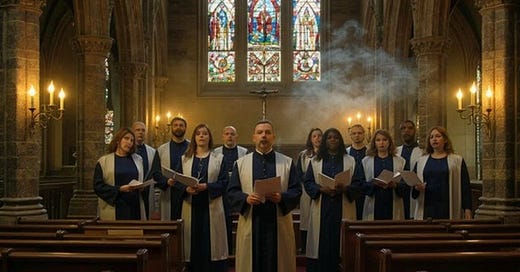Image by FLUX.1 Kontext at Abacus.ai June 2025
Questions for Harriet: 🌿 Harriet Allery (1819–1888) — Totnes, Devon!
My imagined visit to her in a modest cottage in the 1870s, a widow reflecting on a life of rural devotion, continues.
What was it like to marry at fifteen—were you frightened, excited, or both? How did you manage a household with so little and still raise three children? When you go to the Totnes market, what do you look forward to most? Do you remember a moment in your life as an Innkeeper's wife when you felt truly proud? What remedies or cures did your mother teach you that still serve your family? How did you feel when the railway came through—hopeful, or wary of change? If you could choose one hymn to be sung at your funeral, which would it be? What do you miss most about the way things were when you were a child? Has your faith ever been tested? If so, how did you find your way back? What do you hope your children remember most about you?
If you could choose one hymn to be sung at your funeral, which would it be?
Chapter 6: Sundays in St Saviour’s
“That church has heard my joys and sorrows alike. I sang there with babies in my arms.”
Sunday was our anchor. No matter what the week brought—sore backs from the fields, wet laundry refusing to dry, children squabbling over crusts—we dressed in our best and walked the winding road to St. Saviour’s. Samuel wore his good shirt, collar a little tight. I wore my dark wool gown; the hem was brushed clean and faintly scented with lavender from the drawer.
As we reached the crest, the bells would begin—clear and certain, ringing out across Dartmouth’s rooftops. They called everyone, whether faithful or merely curious, and we all came. Inside, the cool stone walls wrapped around us like old arms. That church had held so much: my wedding day, nervous and barely seventeen; each baby in turn, small and wriggling in my arms at their christening. I knew every creak of the pews, every pause in the vicar’s voice. It was all familiar, and that was the comfort.
The children learned early—hands folded, feet still, eyes drifting to the stained glass, where light danced in blues and golds. I taught them the hymns by humming them while hanging washing, so by the time we sang them together, they already knew the tune of faith.
There, in that sacred space, I could finally breathe. My sorrows took the shape of whispered prayers. My thanks glowed in the candlelight. When the harvest was poor or Samuel came home wincing from a long day, I found strength in the Scriptures and in the quiet kindness of neighbours who shared a hymnbook without glancing at the state of your gloves.
Miracles were rare, but grace came often. It came in the scent of beeswax polish, in the warmth of a child leaning against me mid-sermon, in the last low chord of the organ before silence fell. That silence—it wasn’t empty. It held everything I couldn’t put into words.
My preferred hymn would be the one that was a favourite of my children, the one that spoke to them in clear messages. "Abide with Me, fast falls the eventide" by Henry Francis Lyte.
Ms. Perplexity finds the words:
Abide with me: fast falls the eventide;
The darkness deepens; Lord, with me abide.
When other helpers fail and comforts flee,
Help of the helpless, O abide with me.
Swift to its close ebbs out life’s little day;
Earth’s joys grow dim, its glories pass away;
Change and decay in all around I see;
O Thou who changest not, abide with me.
I need Thy presence every passing hour.
What but thy grace can foil the tempter’s power?
Who, like Thyself, my guide and stay, can be?
Through cloud and sunshine, O abide with me.
I fear no foe, with Thee at hand to bless;
Ills have no weight, and tears no bitterness.
Where is death’s sting? Where, grave, thy victory?
I triumph still, if Thou abide with me.
Hold Thou Thy cross before my closing eyes;
Shine through the gloom, and point me to the skies;
Heaven’s morning breaks, and earth’s vain shadows flee;
In life, in death, O Lord, abide with me!
Reflection Prompt:
Think of a sacred or grounding space in your own story—be it a church, a garden, or a family table. What rituals or rhythms helped anchor your ancestors in times of change?





